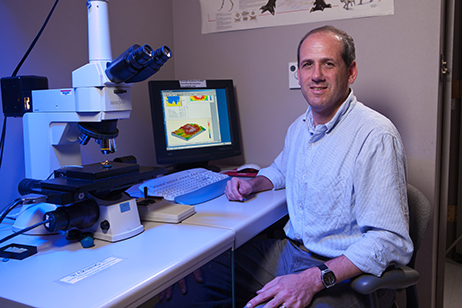FAYETTEVILLE, Ark. – New research challenges the long-held premise that oral health can indicate shifts in human diet, and a University of Arkansas researcher is headed to Africa with the help of an expedited National Science Foundation grant to find answers.
Peter Ungar, distinguished professor and chair of the Department of Anthropology, and Alyssa Crittenden of the University of Nevada, Las Vegas, are headed back to Tanzania to further investigate their pilot findings from January that suggest the transition from a hunter-gatherer to agriculture-based diet cannot necessarily be tracked through dental health as previously thought.
“The effects of the shift from foraging to agriculture on human biology is a holy grail of biological anthropology,” Ungar wrote in the grant proposal. “Bioarchaeologists have made teeth a big part of the story because of the ubiquity of dental remains.”
Dental decay has traditionally been associated with the adoption of an agricultural diet because it introduces more carbohydrates that promote dental disease.
Ungar’s team found evidence in January that could rock that long-standing benchmark when they found dental disease in the Hadza people of East Africa who still rely on a wild-food diet. The NSF grant will allow Ungar’s team to fully analyze the teeth of remaining Hadza hunter-gatherers, those in transition to an agricultural diet and those who have completed the transition.
The researchers will use advanced oral diagnostic technology to document dental surfaces and periodontal disease through exams, laser probe and macro-lens pictures. They will also gather data on diet, gender and age to look for possible hormone-related patterns.
“Oral health has traditionally been a proxy for the onset of agriculture,” Ungar said. “Few have gone out to look at people transitioning from hunter-gatherer diet to an agriculture diet. And this is the last chance. These are the last hunter-gatherers who rely on a 90 percent wild food diet,” Ungar said. “So we have to get in there now.”
Time is running out for anthropologists to study the link between diet and oral health in real time as the last hunter-gatherers in Africa are transitioning to village living at a rate of 15 percent per year.
The Hadza live near Olduvai Gorge, where fossils of the early human ancestors were found in the last century. The landscape in East Africa has shifted in recent years, with increased land regulations, tourism and resource depletion making foraging less sustainable for the Hadza.
“This project may represent the last opportunity to witness firsthand the effects of transition from hunting and gathering to agriculture in Africa on human oral biology,” Ungar said.
Ungar and Crittenden plan to share their findings with the dental health community to improve preventative dentistry and help improve treatment of periodontal disease.
About the University of Arkansas: The University of Arkansas provides an internationally competitive education for undergraduate and graduate students in more than 200 academic programs. The university contributes new knowledge, economic development, basic and applied research, and creative activity while also providing service to academic and professional disciplines. The Carnegie Foundation classifies the University of Arkansas among only 2 percent of universities in America that have the highest level of research activity. U.S. News & World Report ranks the University of Arkansas among its top American public research universities. Founded in 1871, the University of Arkansas comprises 10 colleges and schools and maintains a low student-to-faculty ratio that promotes personal attention and close mentoring.
Topics
Contacts
Peter Ungar, Chair, Department of Anthropology
J. William Fulbright College of Arts and Sciences
479-575-6361, pungar@uark.edu
Amy Schlesing, Director of Science and Research Communications
University Relations
479-575-3033, amys@uark.edu
